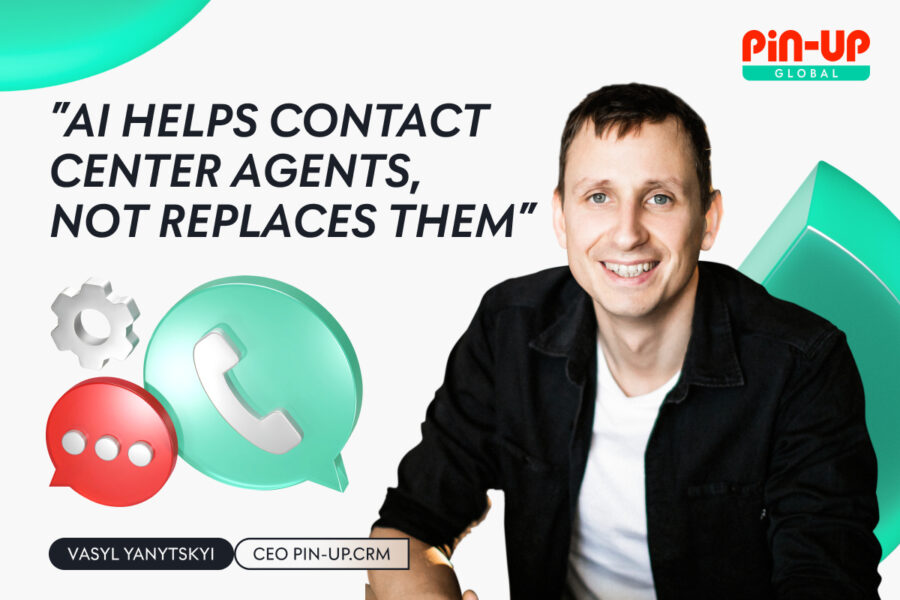PIN-UP.CRM CEO reflects on how artificial intelligence and scripts can “kill” your customer focus

Vasyl Yanitskyi, CEO of PIN-UP.CRM, says the role of AI in customer service is crucial, yet complementary, and stresses the irreplaceable human touch that contact centre operators bring to understanding and resolving customer issues.
Opinion.- Do you know who a contact centre operator is in a company? The person who knows your client best. This is the one who will encounter your consumer first. And one-on-one, not on paper or in diagrams. He will take on his emotions when a person is angry or upset, solve his problems, and help with a task.
All the negativity and, possibly, a set of profanity will be poured onto the contact centre operator. Because let’s be honest, people rarely call to say “thank you.” And it is the contact centre operator who is the person who can recognize the real needs of the client, retain him, and increase his loyalty.
Has it become obvious how important these people are? Then let’s talk further about how to not “kill” your company in pursuit of trends and optimization in customer focus.
So, the most important, most fashionable and most discussed trend of this time is AI. Important? Undoubtedly. Panacea? No. The main rule: artificial intelligence helps contact centre agents, not replaces them.
What can AI do? Quickly answer a standard question that does not require a creative approach. Find instructions, suggest the correct algorithm of actions, give the client a link or the necessary document, and so on. AI can help your client in 10-15 seconds if the question is generic. This is important to relieve operators and give them more time to work with people, where help or advice from a living person is required, rather than a robot.
What can’t AI do? Understand the client’s deeper question and his needs, his emotions, which may be completely irrational at the moment. For example, a person comes to the contact centre with hysterics, that something is not working, that he was deceived, that he is “leaving” you forever.
And here a living person can understand whether there really is an essence of the problem or, for example, a person needs a bonus. And, if he receives this bonus, will he remain a client or not? Will this satisfy his need and make him more loyal to the brand, or, on the contrary, will it anger him even more, because he is making a different request? There are a million nuances here. And sometimes you need to be human to understand a person.
So the question is not whether artificial intelligence is needed in customer service. And the one who can make it as “human” as possible, implements a system that, at the right moment, can quickly switch a person from a robot to an operator. After all, AI is actually capable of deviating from patterns and, in some ways, even being creative.
However, implementing such a system requires time and the work of a large number of live employees. And this is precisely the trend of this year, and not just working with AI.
Second. Do you know what else can “kill” customer focus in your business? Scripts.
Here the story is twofold, as with AI. Communicating using scripts is like communicating with a robot. This can make the customer even more angry and prevent the operator from understanding the real problem.
On the other hand, you need to understand that a young employee who has just joined the company may not be ready to communicate with the client without scripts and resolve issues on his own.
So I am a supporter of the “flexible” system. When a person who already has some experience is transferred from working with scripts to working with dialogue structure. This means that he does not have ready answers to questions, but there is a “skeleton” of dialogue along which he can move. For example, the operator knows that if a client calls and screams, then it is important to “knock down” his scream. But he can be creative in how to do it in a given situation.
Perhaps your client should first spend ten minutes listing all the obscene words that he knows in order to then enter into a constructive dialogue with you. So let him do it and not stop him. This is his emotion and he must express it.
I’ll tell you even more. Sometimes the operator must use obscene language. There are times when this is the only way one will hear you and understand that there is also a living person on the other end. And that now they really listen to him, understand and share his indignation. This cannot be described in a script. But this can change the entire paradigm of communication, turning your client into a brand ambassador. But the moments when such communication may be appropriate cannot be guessed, only felt.
I was not born CEO of PIN-UP.CRM. I worked as an operator, analyst, team lead, trainer and head of the sales department. So, I know very well how important it is sometimes to answer a client: “Fu**, I don’t like it either!” And it is after this that a constructive conversation will begin, and not a flow of emotions.
So, to sum it up, I’ll say: that AI is cool, but it’s not a replacement for people. Scripts are needed, but they are not a substitute for training. The golden rule: a person must hear a person. May the force and clients be with us!











